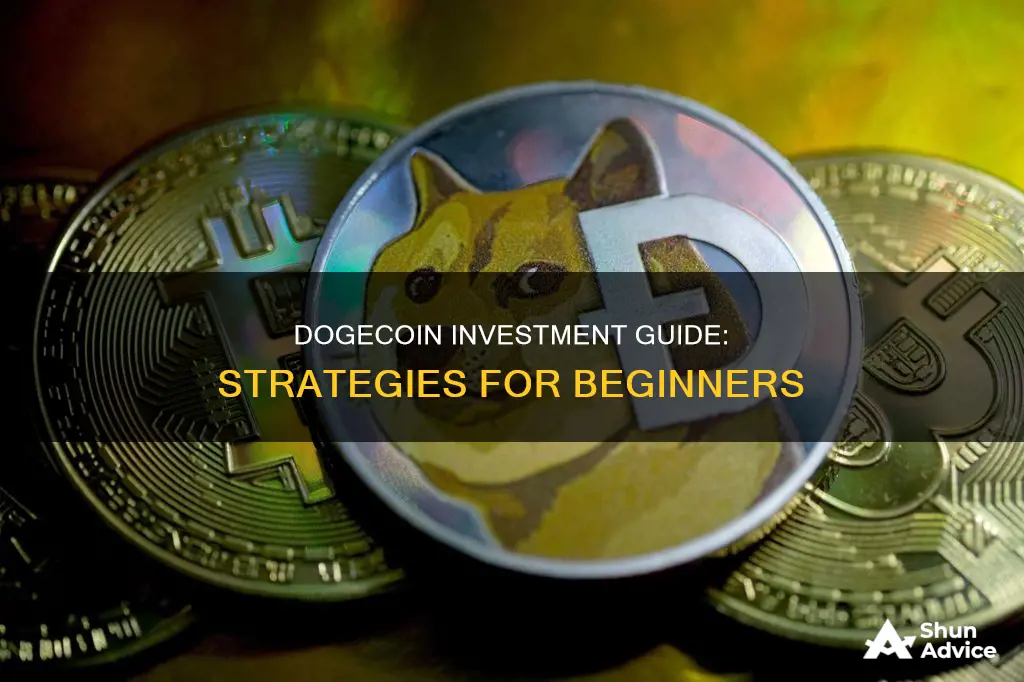
Dogecoin is a cryptocurrency that was initially created as a joke based on a popular internet meme. Despite its lighthearted origins, Dogecoin has gained a devoted community of investors, and its value has surged at times. The cryptocurrency is known for its Shiba Inu logo and its association with Elon Musk.
Dogecoin is a risky and volatile investment due to its unlimited supply and susceptibility to social media hype. Before investing, it is important to understand the risks and do your own research. If you decide to invest, you will need to find a wallet and an exchange that supports Dogecoin and then make your first purchase.
What You'll Learn

Choosing a crypto wallet
There are many different crypto wallets to choose from, so it's important to do your research and select one that suits your needs. Here are some factors to consider when choosing a crypto wallet:
Hot Wallet or Cold Wallet
The first thing to decide is whether you want a hot wallet or a cold wallet. A hot wallet is connected to the internet, making it easier to carry out transactions. However, it may be more vulnerable to hacking. A cold wallet, on the other hand, is not connected to the internet and is usually a physical device that you can disconnect and keep safe. Cold wallets tend to be more secure but are less convenient and can be more expensive.
Security
If security is your main concern, a hardware crypto wallet might be the best option. These wallets come in the form of a USB stick that you can disconnect from your system and the internet for added security. Examples include the Trezor and Ledger Nano X. However, hardware wallets can still be hacked if your password and seed phrase are compromised, and they are more expensive than software wallets.
Mobility
If you want to access your crypto on the go, look for a wallet with a mobile app. Not all wallets are mobile-friendly, especially some of the less established desktop browser extensions. Examples of wallets with mobile apps include Crypto.com DeFi Wallet, Zengo, and Coinbase Wallet.
NFT Compatibility
If you plan to trade NFTs, choose a wallet that is compatible with NFT marketplaces such as OpenSea, SuperRare, and Solanart. For example, Metamask is commonly used to buy, sell, store, and list NFTs on OpenSea. For Solanart, which uses the Solana blockchain, wallets such as Phantom, Solflare, or Sollet are commonly used.
Supported Cryptocurrencies
Make sure the wallet you choose supports the cryptocurrencies you want to store or trade. Some wallets only support a few popular cryptocurrencies, while others let you trade and store obscure types of digital tokens. Examples of wallets that support a wide range of cryptocurrencies include Crypto.com DeFi Wallet, Guarda, Exodus, and Coinbase Wallet.
Staking and Rewards Programs
If you're interested in staking or rewards programs, check if the wallet offers these features. Some wallets, like Crypto.com DeFi Wallet, Guarda, Exodus, and Coinbase Wallet, provide staking and rewards programs.
Ease of Use
Consider how easy the wallet is to use, especially if you're new to crypto. Some wallets have a steep learning curve, while others are more user-friendly. For example, Coinbase Wallet is known for being beginner-friendly.
Coinbase Stock: A Guide to Investing in the Crypto Exchange
You may want to see also

Selecting an exchange
When it comes to selecting an exchange to buy Dogecoin, there are a few things to keep in mind. Firstly, Dogecoin is not as widely available as some of the more established coins, so you might need to find a new exchange that trades Dogecoin and is legally operating within your jurisdiction. Some of the popular exchanges that offer Dogecoin include Coinbase, Binance, Kraken, Gemini, Robinhood, SoFi, Webull, and eToro.
While there are a number of exchanges that offer Dogecoin, finding the right one may take some time and research. Here are some factors to consider when selecting an exchange:
- Reputation and Security: Look for an exchange with a good reputation and robust security measures in place, such as two-factor authentication, cold storage of funds, and regular security audits. Check for any news stories about past issues, and research their website and social media presence to see what others are saying about the exchange.
- Compliance and Regulations: Different exchanges comply with varying regulations depending on their location and the services they offer. Many reputable exchanges will require Know Your Customer (KYC) or Anti-Money Laundering (AML) practices, which can help protect consumers and ensure the exchange's legitimacy.
- Fees and Pricing: Most trading platforms charge fees for trading activity, and these fees can vary across exchanges. Research the fee structures of different exchanges to find the most cost-effective option. Additionally, be mindful of price premiums, where prices may differ slightly across exchanges. Be cautious of exchanges selling coins at prices well below the market value.
- Trading Volume and Liquidity: Consider the trading volume and liquidity of the exchange, especially if you plan to trade Dogecoin frequently. High trading volumes and liquidity can indicate a well-respected exchange. Check the exchange's published figures and third-party volume data for this information.
- User Reviews: Before opening an account, look for user reviews to get an idea of how the exchange operates and treats its users. This can provide valuable insights into the reliability and trustworthiness of the platform.
Bitcoin in India: Is It Worth Investing?
You may want to see also

Payment methods
Once you have chosen a crypto exchange or brokerage platform to buy Dogecoin, you will need to select a payment method.
The most common method is to deposit money from a checking account. Some platforms also allow you to use a savings account, or accept wire transfers and PayPal transfers. You can also use a credit card, but this is generally discouraged as the transaction will be treated as a cash advance, attracting higher fees and interest rates.
If you already own cryptocurrency, you may be able to trade it for Dogecoin. However, not all cryptocurrencies can be exchanged for Dogecoin, and each platform is different in terms of what is allowed.
If you are using a crypto exchange, you will need to sell an equivalent amount of dollars or another cryptocurrency, such as Bitcoin, for Dogecoin at the current market price.
If you are using a third-party platform, such as BitPay, you can buy gift cards with Dogecoin to use at major companies such as Amazon and Walmart. You can also use Dogecoin to pay bills, or send it to another wallet (peer-to-peer transaction).
Peer-to-Peer Transactions
Peer-to-peer (P2P) transactions are a direct and private method of sending or receiving Dogecoin or any other cryptocurrency. This involves transferring funds from one blockchain address to another without a third party. P2P trades are often enabled by online platforms and forums that connect local users who want to trade Dogecoins for products and services.
In-Person Transactions
An increasing number of brick-and-mortar stores are accepting Dogecoin as a form of payment. Typically, stores will display the QR code of their Dogecoin wallet address, which the customer can scan to make a payment.
Online Transactions
Dogecoin can be used to make purchases from e-commerce businesses and online stores. This allows users to buy products from anywhere in the world via international shipping.
Crypto Cards
Crypto cards, such as the BitPay Card, allow you to use Dogecoin like cash. You load the card with Dogecoin from your crypto wallet, and then use it like a regular debit card anywhere that accepts Mastercard.
Bitcoin: A Real Money-Making Investment?
You may want to see also

Amount to invest
Dogecoin is a highly volatile and unpredictable asset. Financial planners generally recommend investing no more than 3% to 5% of your money in cryptocurrencies, and only an amount you are willing to lose.
Dogecoin is different from other cryptocurrencies like Bitcoin, which has a limited supply of 21 million tokens, creating scarcity and helping to retain value. Dogecoin, on the other hand, has over 129 billion tokens in circulation, with no limit on how many can be mined. This means that for Dogecoin's price to increase, investors must continually buy more coins.
When deciding how much to invest, consider your overall financial situation, investment portfolio, and risk tolerance. If you are behind on retirement savings and don't have an emergency fund, you should invest a smaller amount in Dogecoin. If you are financially stable, on track to meet your retirement goals, and have a comfortable cushion in the bank, you may be willing to invest a larger portion of your portfolio in Dogecoin.
It's important to remember that Dogecoin is a risky investment. There is a chance of making significant gains, but also a high probability of losing money. Therefore, only invest an amount that you are comfortable with, and that fits within the recommended percentage range for volatile assets.
Additionally, keep in mind that Dogecoin's value is largely driven by social media movements and hype, and its long-term growth is uncertain. As with any investment, it's crucial to do your research and carefully consider your financial situation before deciding how much to invest in Dogecoin.
Comp Coin: A Smart Investment Decision?
You may want to see also

Storage options
When you buy Dogecoin, it is usually kept in your exchange or brokerage's crypto wallet by default. However, these wallets are generally connected to the internet, so some investors prefer to withdraw their crypto and store it in another wallet.
There are two main types of crypto wallets: hot wallets and cold wallets. Hot wallets are digital and connected to the internet, while cold wallets are physical hardware that can be disconnected from the internet, making them much less susceptible to hacking.
Hot Wallets
Hot wallets are typically free and highly convenient, as they can be accessed from anywhere at any time. However, they are more susceptible to hacking. Examples of hot wallets include:
- Binance custodial software wallet
- Exodus
- Coinbase Wallet
- Atomic Wallet
Cold Wallets
Cold wallets are generally considered more secure than hot wallets, but they are less convenient to use and are generally more expensive. Examples of cold wallets include:
- Ledger Nano X or S
- Trezor Model T or One
- KeepKey
Paper Wallets
Paper wallets are another option for those who want to store their Dogecoin offline. Paper wallets are simply pieces of paper with your private keys printed on them. They are highly secure because they are not connected to the internet, but they are vulnerable to theft or destruction, so it is important to keep them in a safe place.
Smart Bitcoin Investment: How Much to Invest?
You may want to see also
Frequently asked questions
You can buy Dogecoin on a cryptocurrency exchange, such as Coinbase, Binance, or Kraken. You will need to create an account, deposit funds, and then search for Dogecoin on the exchange to make a purchase.
Dogecoin is considered a risky and volatile investment due to its unlimited supply and dependence on social media and hype. Its price can fluctuate significantly, and it has limited use cases.
You can store your Dogecoin in a crypto wallet, either a hot wallet that is digital and connected to the internet or a cold wallet, which is a physical hardware device. Storing Dogecoin in a wallet offers more security than keeping it on an exchange.
Financial planners generally recommend investing no more than 3% to 10% of your portfolio in risky assets like cryptocurrencies. Only invest an amount you are willing to lose.
If you are looking for alternative cryptocurrencies to invest in, you could consider Bitcoin or Ethereum. These are more established coins with different features and risks compared to Dogecoin.







